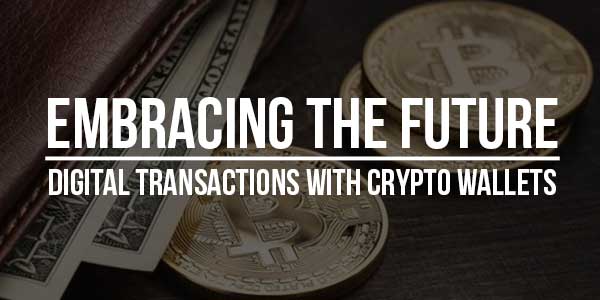
In this fast-paced digital age, financial transactions have undergone a transformative shift. Traditional payment methods are gradually making way for digital transactions, and leading this revolution are crypto wallets. These innovative tools, developed by specialized crypto wallet development companies, have captured the imagination of investors and enthusiasts alike, offering a seamless way to engage with the world of digital currencies. Let’s delve into crypto wallets, understanding their significance, benefits, and how they shape the future of financial transactions.
Table of Contents
Introduction: The Digital Transformation Of Transactions:
The world of finance is undergoing a remarkable transformation, with digital transactions emerging as a dominant force. As traditional methods like cash and checks recede, digital currencies, particularly cryptocurrencies, are becoming integral to our financial ecosystem. Central to this transformation are crypto wallets, serving as secure and convenient repositories for digital assets.
Understanding Crypto Wallets:
Crypto wallets, often called “wallets,” are digital tools that enable users to store, manage, and transact with their cryptocurrencies. Unlike traditional wallets that hold physical cash and cards, crypto wallets store digital assets, which exist only in the virtual realm. These wallets interact with the blockchain, a decentralized digital ledger that records all cryptocurrency transactions.
Types Of Crypto Wallets:
There are several types of crypto wallets, each with its features and advantages. The three primary types are hardware, software, and mobile wallets.
Hardware Wallets:
Hardware wallets are physical devices designed to store private keys offline securely. These wallets provide an extra layer of security by keeping the keys away from internet-connected devices, reducing the risk of online hacking.
Software Wallets:
Software wallets, or desktop wallets, are applications that users install on their computers. They allow for easy access and management of cryptocurrencies, but users must ensure their computers are free from malware or viruses.
Mobile Wallets:
Mobile wallets are smartphone applications that provide on-the-go access to cryptocurrencies. They are convenient for everyday transactions and are often equipped with user-friendly interfaces.
The Mechanics Of Crypto Wallets:
Public and private keys are at the core of a crypto wallet’s functionality. Public keys serve as addresses where users can receive cryptocurrencies, while private keys are secret codes that allow users to access and send their digital assets. Wallet addresses, derived from public keys, ensure the anonymity of transactions.
Security: Safeguarding Your Digital Assets:
As the value of cryptocurrencies continues to rise, security becomes paramount. Various security measures are implemented to protect users’ digital assets, including:
Two-Factor Authentication (2FA):
Two-factor authentication adds an extra layer of security by requiring users to provide two verification forms before accessing their wallets.
Biometric Authentication:
Some wallets offer biometric authentication, such as fingerprint or facial recognition, for enhanced security and ease of access.
Cold Storage:
Cold storage involves keeping private keys completely offline, reducing the risk of online attacks. Hardware wallets often employ cold storage methods.

Embracing Digital Currencies:
Cryptocurrencies are no longer confined to speculation; they are increasingly becoming part of everyday life. From online retailers accepting Bitcoin to remittances being sent in cryptocurrencies, these digital assets are making their mark on various industries.
Benefits Of Crypto Wallets:
The adoption of crypto wallets brings forth several benefits that are shaping the future of financial transactions:
Transparency And Decentralization:
Blockchain technology, which underpins cryptocurrencies, offers transparency and decentralization, reducing the need for intermediaries like banks.
Reduced Transaction Costs:
Crypto transactions often cost less than traditional financial systems, making cross-border transfers more affordable.
Fast And Borderless Transactions:
Cryptocurrency transactions occur almost instantly, regardless of geographical boundaries, enabling swift global transfers.
Navigating The Crypto Wallet Landscape:
Selecting the right crypto wallet is crucial. Factors like security, ease of use, and compatibility with various cryptocurrencies should be considered.
Popular Crypto Wallet Providers:
- Coinbase: Known for its user-friendly interface and security features.
- Ledger Nano S: A reputable hardware wallet for added security.
- Exodus: A software wallet with a sleek design and multi-currency support.
Overcoming Challenges And Concerns:
While the potential of crypto wallets is vast, challenges remain:
Price Volatility:
The value of cryptocurrencies can be highly volatile, presenting both opportunities and risks.
Regulatory Uncertainties:
Different countries have varying regulations for cryptocurrencies, leading to uncertainty for users.
Potential For Hacking:
Online wallets may be vulnerable to hacking attempts, emphasizing the need for robust security measures.
The Future Landscape Of Digital Transactions:
As cryptocurrencies gain acceptance, the future looks promising:
Mainstream Adoption:
With increased awareness and education, cryptocurrencies could become a mainstream mode of payment.
Integration With Traditional Finance:
Cryptocurrencies gradually find their place alongside traditional financial instruments, offering diversification options.
Conclusion: The Promise Of Digital Currency Wallets:
The rise of crypto wallets marks a significant leap in the evolution of financial transactions. As digital currencies gain traction, these wallets enable secure, efficient, and borderless transactions. Embracing crypto wallets means embracing the future of finance.
FAQs:
Are Crypto Wallets Safe?
Crypto wallets employ various security measures, but users must take precautions, such as securing private keys.
Can I Use One Wallet For All Cryptocurrencies?
Some wallets support multiple cryptocurrencies, while others are designed for specific coins. Choose based on your needs.
Are Crypto Transactions Reversible?
Unlike credit card transactions, crypto transactions are irreversible. Always double-check addresses before sending funds.
How Do I Recover My Wallet If It’s Lost?
Most wallets provide recovery options through backup phrases. It’s important to keep these phrases safe.
Will Cryptocurrencies Replace Traditional Money?
While cryptocurrencies offer unique advantages, they will only partially replace traditional currencies shortly.

 About the Author:
About the Author:












Nice overview of how digital transactions work with crypto wallets — great explanation of key concepts like sending/receiving funds, wallet security, and how blockchain makes transactions fast and transparent.
Welcome here and thanks for reading our article and sharing your view. This will be very helpful to us to let us motivate to provide you with more awesome and valuable content from a different mind. Thanks again.